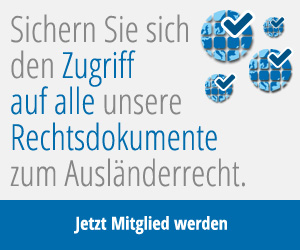In einer Kammerentscheidung vom 2.2.2012 in der Rechtssache I. M. gegen Frankreich (Rs. Nr. 9152/09 - noch nicht rechtskräftig) hat der Europäische Gerichtshof für Menschenrechte (EGMR) einstimmig entschieden, dass die Prüfung eines Asylerstantrags im Schnellverfahren eine Verletzung des Rechts auf effektiven Rechtsschutz aus Art. 13 der Europäischen Menschenrechtskonvention (EMRK) bedeuten kann.
"Aufmerksamkeit verdient, dass der EGMR bei der Prüfung, ob im Asylschnellverfahren effektiver Rechtsschutz gewährleistet ist, auf eine Gesamtbetrachtung der asyl- und aufenthaltsrechtlichen Regelungen und der tatsächlichen Gegebenheiten abstellt. Dies könnte in Deutschland u. a. von Relevanz für das sog. Flughafenverfahren sein, in dem regelmäßig das Zusammenspiel von Einreiseverweigerung, Unterbringung am Flughafen und kurzen Fristen für Asylanhörung, -entscheidung und Anträge auf einstweiligen Rechtsschutz eine geordnete Vorbereitung des Asylantrags unmöglich macht", so Einsender Heiko Habbe (Jesuiten-Flüchtlingsdienst Deutschland, Policy Officer) mit Verweis auf Stefan Keßler, JRS Europe.
Antragsteller war ein Staatsangehöriger des Sudan, der versucht hatte, von Spanien aus irregulär nach Frankreich einzureisen, und bei dem Versuch von den französischen Behörden festgenommen wurde. Nach seinen Angaben wurde auf sein sofort geäußertes Begehren, Asyl beantragen zu wollen, zunächst nicht reagiert. Weil sein schließlich gestellter Antrag bei der französischen Asylbehörde OFPRA erst registriert wurde, nachdem bereits eine Rückkehrentscheidung gegen ihn ergangen war, wurde dieser als "Missbrauch des Asylverfahrens" eingestuft und in einem Schnellverfahren entschieden. Die Entscheidung zur Durchführung des Schnellverfahrens wurde automatisch und ohne Prüfung der individuellen Umstände des Einzelfalles getroffen. Die Asylanhörung des Antragstellers fand acht Tage nach Registrierung seines Antrags statt. Sie dauerte eine halbe Stunde. Vor dem EGMR rügte er, ihm habe nicht genug Zeit zur Vorbereitung seines Antrags zur Verfügung gestanden; insbesondere habe sie nicht ausgereicht, erforderliche Dokumente zu beschaffen (etwa ein ärztliches Attest und eine Bestätigung, dass er in Darfur gelebt habe). Im Protokoll der OFPRA wurde später auf die Unbestimmtheit des Vortrags des Antragstellers, insbesondere bezüglich seiner Herkunft und der behaupteten Verfolgung, hingewiesen. Parallel legte der Antragsteller Rechtsmittel gegen seine Abschiebung ein. Eine stattgebende Entscheidung des französischen Verwaltungsgerichts hätte zwar aufschiebende Wirkung gehabt, für das Rechtsmittel standen dem Antragsteller aber nur 48 Stunden zur Verfügung. In dieser Zeit war es ihm nicht möglich, einen schriftlichen Antrag in französischer Sprache zu stellen und mit entsprechenden Beweismitteln zu belegen. Auch seinen Pflichtanwalt hatte er erst kurz vor der gerichtlichen Anhörung erstmals treffen können. Das Rechtsmittel wurde zurückgewiesen. Der Antragsteller wurde im Februar 2011 durch Frankreich als Flüchtling anerkannt, nachdem der EGMR im Verfahren nach Art. 39 EMRK die französische Regierung um Aufschub der Abschiebung gebeten hatte, was dem Antragsteller Gelegenheit gab, die fehlenden Dokumente zu beschaffen und im Klagverfahren gegen seine Asylablehnung vorzulegen. Der EGMR hielt fest, dass nach einer OFPRA-Statistik die Schnellverfahren einen Anteil von 24 % aller in Frankreich gestellten Asylanträge stellen, und dass 62,5 % der Schnellverfahren sich auf Asylerstanträge beziehen. Während eine erneute Prüfung eines Asylantrags im Schnellverfahren als weniger problematisch erscheine, weil der entsprechende Fall zuvor im normalen Verfahren geprüft worden sei, gelte dies nicht für Asylerstanträge. Unter Berücksichtigung der Gesamtumstände eines Schnellverfahrens, insbesondere der kurzen Fristen und der Verfahrenshürden bei der Vorlage von Beweisen, könne die Prüfung eines Asylantrages in dieser Art von Verfahren dazu führen, dass der Vortrag des Schutzsuchenden nicht mit der größtmöglichen Sorgfalt geprüft werde und ihm daher der Zugang zu effektivem Rechtsschutz verweigert werde. Negativ ausgewirkt habe sich auch, dass der Betroffene seinen Asylerstantrag aus der Abschiebungshaft heraus habe stellen müssen. Diese Gesamtumstände könnten zu einer Verletzung von Art. 13 EMRK führen. Der EGMR wies in diesem Zusammenhang besonders darauf hin, dass der Klage des Antragstellers gegen die ablehnende Asylentscheidung im Schnellverfahren keine aufschiebende Wirkung zukam und er ohne die Entscheidung nach Art. 39 EMRK vermutlich ohne ausführliche Würdigung seines Asylbegehrens abgeschoben worden wäre. Die Kammer sprach dem Antragsteller Schadensersatz in Höhe von 4.746,25 Euro für seine Auslagen zu.
Text der englischen Pressemitteilung des EGMR:
First-time asylum seeker was not given effective remedy under fast-track procedure for examination of his case
In today’s Chamber judgment in the case I. M. v. France (application no. 9152/09), which is not final (under Articles 43 and 44 of the Convention, this Chamber judgment is not final. During the three-month period following its delivery, any party may request that the case be referred to the Grand Chamber of the Court. If such a request is made, a panel of five judges considers whether the case deserves further examination. In that event, the Grand Chamber will hear the case and deliver a final judgment. If the referral request is refused, the Chamber judgment will become final on that day. Once a judgment becomes final, it is transmitted to the Committee of Ministers of the Council of Europe for supervision of its execution.
Further information about the execution process can be found here: www.coe.int/t/dghl/monitoring/execution), the European Court of Human Rights held, unanimously, that there had been: A violation of Article 13 (right to an effective remedy) taken together with Article 3 (prohibition of inhuman or degrading treatment) of the European Convention on Human Rights The case concerned the risks the applicant would face in the event of his deportation to Sudan and the effectiveness of the remedies available to him in France in view of the fact that his asylum application was dealt with under the fast-track procedure.
Principal facts
The applicant, I.M., is a Sudanese national who was born in 1976 and lives in Perpignan (France). In December 2008 he travelled to Spain with a view to crossing the border into France, carrying a forged French visa. In Sudan, he had been arrested by the police on account of his activities within a student movement and his alleged links with rebel groups in Darfur. He had spent eight days in detention in May 2008 and a further two months under surveillance by the Sudanese authorities, who interrogated him on a weekly basis using violence. On his arrival at the French border the applicant was arrested for illegally entering or staying in France and for forgery and use of forged documents. According to his submissions, he immediately said that he wished to apply for asylum but received no response. He was remanded in custody and appeared before the Perpignan tribunal de grande instance, which sentenced him to one month’s imprisonment for an offence under the aliens legislation. According to the applicant, he restated before the court his intention to claim asylum, to no avail. While in detention I.M. applied to the administrative court challenging the order for his removal issued by the prefecture on 7 January 2009. Owing to the 48-hour deadline for submitting that application, he was able to draft it only in Arabic rather than in French. According to the applicant, he then had only a few minutes before the hearing in which to talk to the duty lawyer handling his case. His application was rejected on the grounds that no conclusive evidence had been provided to substantiate his claim that he faced a risk of ill-treatment in Sudan. The court also observed that the applicant had not lodged an asylum application. On 16 January 2009 I.M. was placed in administrative detention with a view to his deportation. He was informed the same day of the possibility of applying for asylum, and lodged an application on 19 January 2009 with the assistance of CIMADE, an association which assists foreign nationals, particularly those in administrative detention. His asylum application was registered on 22 January 2009 under the fast-track procedure, and on 30 January 2009 he was questioned by the French Office for the Protection of Refugees and Stateless Persons (OFPRA) in the course of a half-hour interview. I.M. stated that he been unable, in the few days allowed to him, to prepare his case effectively and to assemble all the documents needed to support his application (a medical certificate and certificate of residence in Darfur). The OFPRA report, which was not sent to the applicant until much later, referred to the vagueness of his statements, in particular regarding his origins and the alleged persecution. On 31 January 2009 he was notified of the refusal of his application by OFPRA. He appealed against that decision to the National Asylum Tribunal (Cour nationale du droit d’asile). Once his asylum application had been refused by OFPRA, the authorities could take steps to deport him. On 16 February 2009 the applicant applied to the European Court of Human Rights under Rule 39 of the Rules of Court (interim measures), seeking to have the order for his deportation suspended. The Court granted his request for the duration of the proceedings before it. On 19 February 2011 the National Asylum Tribunal granted the applicant refugee status. In the meantime, he had obtained a certificate of residence from his municipality of origin in Darfur and a medical report issued by a psychiatrist stating that he had been subjected to violence.
Complaints, procedure and composition of the Court
The applicant alleged that enforcement of the decision of the French authorities to deport him to Sudan would place him at risk of treatment in breach of Article 3 (prohibition of inhuman or degrading treatment). Relying on Article 13 (right to an effective remedy), taken together with Article 3, he submitted that no effective remedy had been available to him in France owing to the fact that his asylum application had been dealt with under the fast-track procedure. The application was lodged with the European Court of Human Rights on 16 February 2009.
Judgment was given by a Chamber of seven, composed as follows:
- Dean Spielmann (Luxembourg), President,
- Elisabet Fura (Sweden),
- Jean-Paul Costa (France),
- Karel Jungwiert (the Czech Republic),
- Mark Villiger (Liechtenstein),
- Isabelle Berro-Lefèvre (Monaco),
- Ganna Yudkivska (Ukraine), Judges, and also
- Stephen Phillips, Deputy Section Registrar.
The Office of the United Nations High Commissioner for Refugees (UNHCR) submitted observations in its capacity as a third-party intervener in the proceedings (Article 36 § 2 of the Convention). The observations are set out in the judgment (§ 116).
Decision of the Court
Article 3
The Court considered it sufficiently established that the applicant no longer faced deportation to Sudan and that he was certain to be able to remain in France, since 3 persons who had been granted refugee status were immediately issued with a residence permit. The Court therefore rejected the applicant’s complaint concerning the risks he would face if he were deported to Sudan.
Article 13
The Court reiterated that in asylum and immigration cases it confined itself, in accordance with the subsidiarity principle, to verifying that the domestic procedures were effective and that they safeguarded human rights. The way in which States organised domestic remedies fell within their margin of appreciation; the necessary guarantees against arbitrary deportation could be afforded by the aggregate of remedies under domestic law, which could accordingly satisfy the requirements of Article 13 even if no single remedy by itself did so.
Procedure before OFPRA and the National Asylum Tribunal
In the Government’s submission, in view of the arrangements in place for that purpose, any request for asylum made by the applicant while in police custody would have been registered. The Court observed that I.M. had been unable to report in person to the prefecture as required by French law and that the police reports provided some indications that he had attempted to apply for asylum while he was still in police custody. The authorities had taken the view that the asylum application lodged by the applicant while in administrative detention had been based on “deliberate fraud” or constituted “abuse of the asylum procedure” for the purposes of the French legislation, for the simple reason that it had been submitted after the order for his removal had been issued. It was on that basis that his application had been registered under the fasttrack procedure, which had certain specific features distinguishing it from the asylum procedure under ordinary law (“the normal procedure”), particularly with regard to time-limits. The Court noted the automatic nature of the decision to fast-track applications, which was based on procedural grounds and was not linked to the circumstances of the case or to the terms or merits of the application. The Court acknowledged that fast-track asylum procedures, which were applied in many European countries, could make it easier to process applications that were clearly unreasonable or manifestly ill-founded. While the re-examination of an asylum application under the fast-track procedure did not deprive aliens in administrative detention of a detailed review of their claims, in so far as they had had a first application examined under the normal procedure, this was not the case with first-time applications (applications under the fast-track procedure account for 24% of the overall number of applications, and 62.5% of fast-track procedures relate to first-time applications (OFPRA annual report, see § 63 of the judgment). Thus, the consideration of I.M.’s asylum application by OFPRA under the fast-track procedure would have been the only examination of the merits of his asylum claim prior to his deportation had his request to the European Court of Human Rights for interim measures not been granted in good time. Because the asylum claim had been registered under the fast-track procedure, the time-limit for lodging the application had been reduced from 21 to five days. This was a short period which imposed certain constraints, as the applicant was expected to submit an application in French – without any linguistic assistance – meeting the same requirements as applications under the normal procedure, and to provide supporting documents concerning, among other things, his ethnic origin. The Court stressed that this information had been decisive, since the succinct reasoning of OFPRA’s decision had focused primarily on the inconsistencies and lack of conclusive evidence in the applicant’s application.
Application to the administrative court
The application to the administrative court challenging the deportation order, which had full suspensive effect, had theoretically made it possible to conduct an effective examination of the risks allegedly faced by the applicant in Sudan. However, the latter had had only 48 hours in which to prepare his application, a period much shorter than the two months allowed under ordinary law before the administrative courts. He had been able to submit his application only in the form of a letter written in Arabic which an officially appointed lawyer, with whom he had a brief meeting shortly before the hearing, had read out without having the opportunity to add any evidence to it. This had formed the basis for the rejection of the application lodged by I.M., who had also been criticised for not having previously lodged an asylum claim, although it was not demonstrated that he had actually been in a position to do so. The Court therefore observed, with regard to the effectiveness of the domestic legal arrangements as a whole, that while the remedies of which the applicant had made use had been available in theory, their accessibility in practice had been limited by the automatic registration of his application under the fast-track procedure, the short deadlines imposed and the practical and procedural difficulties in producing evidence, given that he had been in detention and applying for asylum for the first time. The applicant’s application to the administrative court had been adversely affected by the conditions in which he had had to prepare it and the inadequate legal and linguistic assistance provided. The Court further noted that the interview with OFPRA had been brief, lasting only 30 minutes, despite the fact that the case was complex and concerned a first-time asylum claim. The resulting negative impact on the effectiveness of the remedies used by the applicant had not been offset at the appeal stage. Following the proceedings before OFPRA and the administrative court, his deportation, to which no further obstacles remained, had been prevented only by the application of Rule 39 of the Rules of the European Court of Human Rights. In that connection the Court noted in particular that an appeal to the National Asylum Tribunal did not have suspensive effect when the fast-track procedure had been applied. While the effectiveness of a remedy within the meaning of Article 13 did not depend on the certainty of a favourable outcome for the applicant, the Court could not but conclude that, without its intervention, the applicant would have been deported to Sudan without his claims having been subjected to the closest possible scrutiny. He had not had an effective remedy in practice by which to assert his complaint under Article 3 of the Convention. The Court therefore held that there had been a violation of Article 13 taken together with Article 3.
Rule 39 of the Rules of Court
The Court considered that the measures it had indicated to the French Government under Rule 39 of the Rules of Court – to refrain from deporting the applicant to Sudan –should remain in force until such time as the judgment became final or the Court gave another ruling on the subject.
Article 41
The Court held that the finding of a violation constituted sufficient just satisfaction for the non-pecuniary damage sustained by the applicant. It held that France was to pay the applicant 4,746.25 euros (EUR) in respect of costs and expenses. The judgment is available only in French.
This press release is a document produced by the Registry.
It does not bind the Court. Decisions, judgments and further information about the Court can be found on www.echr.coe.int. To receive the Court’s press releases, please subscribe to the Court’s RSS feeds.
Press contacts
Diese E-Mail-Adresse ist vor Spambots geschützt! Zur Anzeige muss JavaScript eingeschaltet sein! | tel: +33 3 90 21 42 08
Celine Menu-Lange (tel: + 33 3 90 21 58 77)
Tracey Turner-Tretz (tel: + 33 3 88 41 35 30)
Kristina Pencheva-Malinowski (tel: + 33 3 88 41 35 70)
Nina Salomon (tel: + 33 3 90 21 49 79)
Denis Lambert (tel: + 33 3 90 21 41 09)
The European Court of Human Rights was set up in Strasbourg by the Council of Europe Member States in 1959 to deal with alleged violations of the 1950 European Convention on Human Rights.




